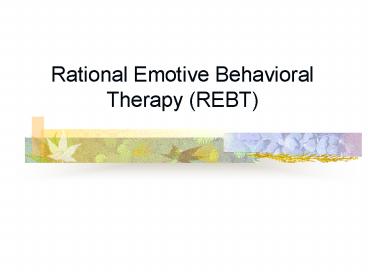Rational Emotive Behavioral Therapy (REBT) - PowerPoint PPT Presentation
1 / 14
Title: Rational Emotive Behavioral Therapy (REBT)
1
Rational Emotive Behavioral Therapy (REBT)
2
View of Human Nature human beings
- have both rational and irrational thinking
- are self-talking and self-evaluating
- have a tendency toward growth and actualization
- keep ourselves disturbed through self-talk
- have the capacity to change cognitive, emotive,
and behavioral processes
3
Key concepts in REBT
- Stresses thinking, judging, analyzing, and doing
- Assumes that cognitions, emotions, and behaviors
interact to have a causal effect relationship - Is a highly didactic, directive approach
- concern thinking and feeling
- Emotions are mainly generated by our beliefs,
evaluations, interpretations, and reactions to
life situations
4
View of Emotional Disturbance
- We learn irrational beliefs from significant
others during childhood - Teach clients to feel un-depressed even when they
are unaccepted and unloved by significant others.
- Self-blame ? emotional disturbances
- Irrational idea ? internalize ? self-defeating
- We have a tendency to make ourselves emotionally
disturbed by internalizing self-defeating beliefs
5
The A-B-C theory of personality
6
Irrational Ideas
- Irrational ideas lead to self-defeating behavior
- Some examples
- I must have love or approval from all the
significant people in my life. - I must perform important tasks competently and
perfectly. - If I dont get what I want, its terrible, and I
cant stand it.
7
Therapeutic Goals
- Minimize emotional disturbances
- Decrease self-defeating behaviors
- Become more self-actualized
- Acquire unconditional self-acceptance and
unconditional other acceptance - Think rationally, feel appropriately, and act
more effectively in achieving the goals of living
happily
8
Therapists function and Role
- Discover clients irrational beliefs
- Make connection of how irrational beliefs lead to
emotional disturbances - Modify clients irrational beliefs.
- Dispute irrational beliefs and substitute
rational beliefs - Not spending too much time on exploring clients
early history
9
The Therapeutic Relationship
- The therapeutic relationship is important, but
intensive relationship is not required. - Therapists show great faith in their clients
ability to change themselves. - Therapists disclose their own beliefs to clients
10
Therapeutic techniques--Cognitive methods
- Disputing irrational beliefs
- If I dont get what I want, it is not at the end
of the world - Writing cognitive homework
- Applying ABC theory to daily life problems
- Changing ones language
- It would be absolutely awful.?It would be
inconvenient - Cost-benefit analysis
- Make a list of advantages/disadvantages of
smoking
11
Therapeutic techniques--Emotional Methods
- Rational-emotional imagery
- Imagine the worst things that could happen to
them - Role playing
- Shame-attacking exercises
- Take risks to do something that the clients are
afraid to do because of what others might
thinkuntil they realize that their feelings of
shame are self-created. - Forceful self-dialogue
- A dialogue with oneself
12
Therapeutic techniques--Behavioral methods
- Activity homework
- Write assignments that target on irrational
beliefs in order to reduce them - Reinforcements and penalties
- Reward?when accomplish a task penalize?fail to
attempt a task - Skill Training
- Assertiveness training
13
Research on REBT
- More than 250 studies
- Most research on irrational beliefs
- Review of outcome studies
- REBT was more significantly more effective than
other therapies or control group in 31 of 47
studies (DiGiuseppe Miller, 1977) and in 49 of
89 studies (Silverman, McCarthy, McGovern,
1992). - Research Efforts
- Most studies focus only on cognitive methods
14
Summary and Evaluation
- Contributions
- focus on how we interpret and react to events
- put insight into action
- teach clients how to be their own therapists
- Limitations
- too confrontational
- ignoring the past
- power imbalance (teacher-student)































